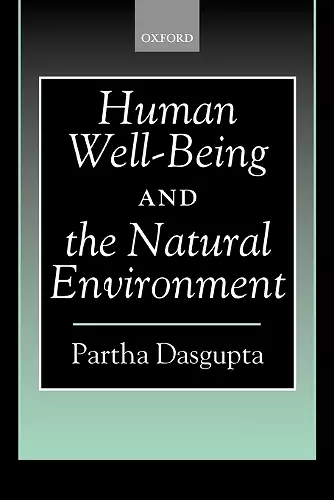Human Well-Being and the Natural Environment
Format:Paperback
Publisher:Oxford University Press
Published:18th Mar '04
Currently unavailable, and unfortunately no date known when it will be back
This paperback is available in another edition too:
- Hardback£105.00(9780199247882)

In Human Well-Being and the Natural Environment, Partha Dasgupta explores ways to measure the quality of life. In developing quality-of-life indices, he pays particular attention to the natural environment, illustrating how it can be incorporated, more generally, into economic reasoning in a seamless manner. Professor Dasgupta puts the theory that he develops to use in extended commentaries on the economics of population, poverty traps, global warming, structural adjustment programmes, and free trade, particularly in relation to poor countries. The result is a treatise that goes beyond quality-of-life measures and offers a comprehensive account of the newly emergent subject of ecological economics. With the publication of this new paperback edition, Professor Dasgupta has taken the opportunity to update and revise his text in a number of ways, including developments to facilitate its current use on a number of gradate courses in environmental and resource economics. The treatment of the welfare economics of imperfect economies has been developed using new findings, and the Appendix has been expanded to include applications of the theory to a number of institutions, and to develop approximate formulae for estimating the value of environmental natural resources.
highly recommended for policy makers and students of environment and development notably those with an interest in collective action. International donors and multilateral banks with a large portfolio of projects in the water and forestry sectors could also benefit immensely from some of the insights this book provides * Development and Change *
Review from previous edition 'Building on his classic magnum opus .... Partha Dasgupta has joined this rethink in an intellectually rich, thought-provoking and occasionally metaphysical work. His new book probes many issues beyond those that might be anticipated from the title and confirms his position as one of the most exciting economic thinkers today ... we can ask why so many feel we need reforms in ethical behaviour to ensure sustainability. Dasgupta touches on some of the framework needed to answer this question. More is needed. If anyone is going to supply it is is likely to be Dasgupta.' * Times Higher Education Supplement *
'Professor Dasgupta's latest book is a remarkably comprehensive account of his subject. It seeks out and develops the fundamentals so thoroughly that its methods will have application in many branches of economic evaluation and policy assessment even beyond the environmental aspects that are its primary focus. He moves with ease from deep studies of the meaning of concepts like ''sustainability'' to detailed empirical accounts of environmental damage. It is a book that will be used and consulted for a long time to come.' * Professor Kenneth J. Arrow, Stanford University *
'Partha Dasgupta is one of the deepest thinkers and most powerful analysts in ecological economics. [In this book] he attempts to go beyond measures of current well-being, such as the Human Development Index of the United Nations Development Programme because, as he puts it, "The present is the past's future". His tightly reasoned and carefully presented effort will enrich the thinking of students and professionals in economics, environmental studies, political science, political philosophy, and population studies.' * Professor Joel E. Cohen, Rockefeller University and Columbia University *
'The anthropologist notices that, as a tribe, economists love argument, which means of course that they also love theory and exact measurement. The great economists add to these two loves one more, a passion for justice. Partha Dasgupta adds yet another---compassion. His understandings of the meaning of poverty and of helpless imprisonment in poverty traps provide a commonsense platform for proposing new measurements and challenging professional assumptions. This is how the book transcends its own formidable proficiency as it initiates the non-professional reader into the idea of social cost benefit.' * Professor Mary Douglas, University College London *
'Concepts like GDP focus on easily measurable things, whilst omitting ecosystem services and other environmental factors on which life ultimately depends. Partha Dasgupta is a seminal figure in his discipline, taking on the difficult, yet hugely important, task of trying meaningfully to measure ''quality of life''. This book will, I hope, set the tone for the new millennium, melding conventional economic concepts, ecological and environmental science, and a great deal of plain commonsense. Read it.' * Lord Robert May, University of Oxford *
Dasgupta raises the most challenging moral questions of our age: Is there a utilitarian foundation for trading off an entire species-habitat for the gratification of the current generation? Are decisions about procreation and the sustenance of ecological systems based strictly on personal morality or based on a broader political ethic? In the process of asking these big questions, he addresses the role of citizenship, civil rights, democracy, and "progress." He explores intergenerational well-being and conflicts. He asks how we do, and how we should value goods. He presents a powerful analysis of the evaluation of policies in imperfect economies. Reading this book is the equivalent of a crash course in political economy and moral philosophy. I wholeheartedly recommend it as one of the most important books of the new millennium. * Professor Elinor Ostrom, Indiana University *
Partha Dasgupta is a very highly regarded economic theorist, and his book shows why. Dasgupta writes more clearly, and in a more accessible manner... than most highly regarded economic theorists. * Journal of Public Policy *
ISBN: 9780199267194
Dimensions: 234mm x 156mm x 21mm
Weight: 560g
376 pages